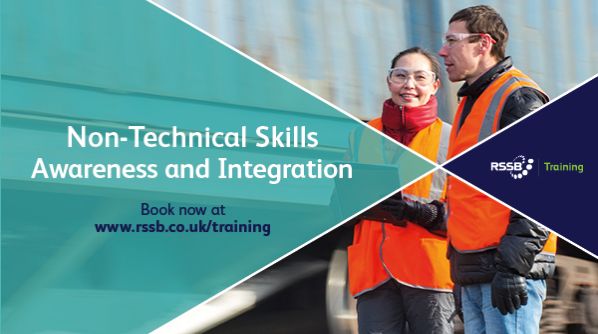THE railway relies on technical skills to keep passengers and staff safe, whether it’s operating signals, driving trains, or running control centres. But other skills matter just as much. Managing workloads, staying constantly aware of the surrounding environment and being alert to risks are just some of the skills that could make the difference between a safe situation and a potentially dangerous one.
These non-technical skills matter, but they’re not always fully understood or appreciated. That’s why the Rail Safety & Standards Board (RSSB) offers training to help organisations build awareness and to promote adoption among their own people.
RSSB is the independent, not-for-profit organisation that works for a better, safer railway in the UK. ”Non-technical skills are behavioural skills,” says Paul Leach, RSSB’s head of human factors, who is also one of the trainers. “While people often apply them without realising, if these skills are not applied correctly, they can contribute to errors that can lead to safety incidents on the railway.”
Boosting safety and performance
Access to the training is just one of the benefits of being an RSSB affiliate. Several international rail organisations have taken this opportunity – RSSB has run the non-technical skills training for Etihad Rail in Abu Dhabi and for Melbourne’s metro. Other organisations - from maintenance to cleaning companies - could also benefit. “The training ultimately helps anyone in a frontline role who has an impact on safety or performance,”’ Leach says.
The training comprises either a three-day open course, or a two-day version that organisations can tailor to their own needs. It first examines what non-technical skills are. RSSB has listed 26 non-technical skills in seven categories: situational awareness, communication, workload management, co-operation and working with others, decision-making and action, conscientiousness, and self-management.
”A conductor (guard) needs situational awareness to assess risks as a train comes into a platform,” Leach explains. “Are passengers too close to the edge? The conductor might have to communicate clearly, as well as make decisions. Is it safe to close the train doors? Does the conductor need to intervene? Organisations know these skills exist but don’t always have good ways of talking to staff about them or developing their awareness. That’s where we aim to help.”
The training helps managers and others to make people more aware of non-technical skills. . “People can see these skills as common sense, so they often don’t really think about how they’re using them although they are at all times, particularly in high workload, degraded or emergency situations when these skills are really stretched. People might also have routines that make them less aware of risk because they’re only looking for things they expect to see. By formalising and naming the skills, we enable line managers, trainers, or those assessing staff’s competence to help people be more mindful of the skills, and be better able to apply them in their work. The training also helps front line staff identify how they develop their non-technical skills.”
Tailoring training
TransPennine Express, a British train operating company, tailored the course to managers working with drivers and guards. “It meant everyone was talking about the same things in the same way and had a better idea of how to help staff, as well as make the skills part of training, development, and performance reviews in a standardised way,’ Leach says.
The training is equally suited to organisations with roles that aren’t so obviously related to rail, Leach adds. “Cleaners in depots need a lot of situational awareness, decision-making skills and conscientiousness, with trains moving in and out,” he says. “They’ll be walking near tracks, clearing up spills and getting on and off trains in the depot. Our training means they’ll be more conscious of the skills they need to be safe.”
As well as training, affiliates to RSSB also get access to the organisation’s expertise, research and data, consultancy, and tools.
For more about becoming an RSSB affiliate and the benefits it offers, fill in this enquiry form or visit the RSSB affiliation webpage.

